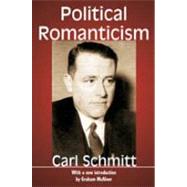
Political Romanticism
by Schmitt CarlBuy New
Rent Textbook
Rent Digital
Used Textbook
We're Sorry
Sold Out
How Marketplace Works:
- This item is offered by an independent seller and not shipped from our warehouse
- Item details like edition and cover design may differ from our description; see seller's comments before ordering.
- Sellers much confirm and ship within two business days; otherwise, the order will be cancelled and refunded.
- Marketplace purchases cannot be returned to eCampus.com. Contact the seller directly for inquiries; if no response within two days, contact customer service.
- Additional shipping costs apply to Marketplace purchases. Review shipping costs at checkout.
Summary
Author Biography
Table of Contents
| Introduction to the Transaction Edition | p. ix |
| Translator's Introduction | p. xxiii |
| Preface | p. 1 |
| Introduction | p. 22 |
| The German conception: political romanticism as an ideology of reaction and restoration | p. 22 |
| The French conception: romanticism as a revolutionary principle; Rousseauism | p. 25 |
| The explanation of revolution in terms of the esprit romantique and the esprit classique | p. 28 |
| The confusion of the concept of political romanticism and the path to a definition | p. 29 |
| The Outward Situation | p. 35 |
| The personal political significance of romantic writers in Germany | p. 35 |
| Schlegel's political insignificance | p. 37 |
| Müller's political development: an Anglophile in Göttingen, a feudal and estatist-conservative anticentralist in Berlin, a functionary of the absolutist centralized state in the Tyrol | p. 39 |
| The Structure of the Romantic Spirit | p. 51 |
| La recherche de la Réalité | p. 51 |
| The occasionalist structure of romanticism | p. 78 |
| Political Romanticism | p. 109 |
| Survey of the development of theories of the state since 1796 | p. 109 |
| The difference between the romantic conception of the state and the counterrevolutionary and legitimist conception | p. 115 |
| The state and the king as occasional objects of romantic interest | p. 123 |
| The romantic incapacity for ethical and legal valuation | p. 124 |
| Romanticized ideas in political philosophy | p. 125 |
| Adam Müller's productivity: his mode of argumentation: the rhetorically formed resonance of significant impressions; his antitheses: rhetorical contrasts | p. 127 |
| The occasional character of all romanticized objects | p. 144 |
| Brief indication of the difference between political romanticism and a romantic politics: In the latter, it is the effect and not the cause that is occasional | p. 149 |
| Excursus: the romantic as a political type in the conception of the liberal bourgeoisie, exemplified by David Friedrich Strauss's Julian the Apostate | p. 149 |
| Conclusion: political romanticism as the concomitant emotive response to political events | p. 158 |
| Notes | p. 163 |
| Index | p. 169 |
| Table of Contents provided by Ingram. All Rights Reserved. |
An electronic version of this book is available through VitalSource.
This book is viewable on PC, Mac, iPhone, iPad, iPod Touch, and most smartphones.
By purchasing, you will be able to view this book online, as well as download it, for the chosen number of days.
Digital License
You are licensing a digital product for a set duration. Durations are set forth in the product description, with "Lifetime" typically meaning five (5) years of online access and permanent download to a supported device. All licenses are non-transferable.
More details can be found here.
A downloadable version of this book is available through the eCampus Reader or compatible Adobe readers.
Applications are available on iOS, Android, PC, Mac, and Windows Mobile platforms.
Please view the compatibility matrix prior to purchase.
